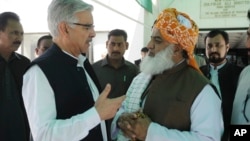Pakistan’s parliament on Friday unanimously approved a resolution promising the country will stay neutral in the conflict in Yemen, despite Saudi requests for Islamabad to participate in the coalition fighting Shi’ite Houthi rebels.
Prime Minister Nawaz Sharif had summoned the emergency joint session to debate a Saudi request for Sunni-dominated Pakistan to send its warships, planes and ground troops to help the Saudi-led military coalition.
A heated debate continued for five days, as many lawmakers strongly opposed any Pakistani military intervention in Yemen. They feared such a move would fuel sectarian tensions inside Pakistan and undermine relations with neighboring Iran, which is believed to be assisting the Houthis.
While Sunni-dominated Pakistan has deep economic, religious and military ties to Saudi Arabia, it shares a porous border with Iran stretching 900 kilometers or 560 miles. A fifth of its 180 million residents are Shi’ite Muslims.
Conflict draws ‘serious concern’
After debate ended Friday, the lawmakers unanimously adopted a resolution that expressed "serious concern" about Yemen’s deteriorating security and humanitarian situation.
Pakistani finance minister Ishaq Dar read out the resolution’s text before it was moved for approval: "Parliament of Pakistan calls upon the warring factions in Yemen to resolve their differences peacefully through dialogue.… [It] apprehends that the crisis in Yemen could plunge the region into turmoil.… [It] desires that Pakistan should maintain neutrality in the Yemen conflict so as to be able to play a proactive diplomatic role to end the crisis."
The parliament reiterated Pakistan’s determination to defend Saudi Arabia against any threat to its territorial integrity.
The legislative body "expresses unequivocal support for the Kingdom of Saudi Arabia and affirms that in case of any violation of its territorial integrity or any threat to Harmain Sharifain [Islamic holy places], Pakistan will stand shoulder to shoulder with Saudi Arabia and its people," Dar said.
Asked whether the government would comply with parliament's decision, Information Minister Pervez Rasheed said the resolution reflects the sentiment of the Pakistani nation, and his government "fully respects its each and every provision."
Houthi rebels advancing
The Saudi-led regional military coalition began bombing rebel positions in Yemen March 25 to prevent the Shi’ite Houthis and their allies from extending their influence across Yemen. But the rebel advances are continuing. Aid groups warn of a compounding humanitarian crisis in conflict-hit areas, particularly in the strategic port city Aden.
Earlier this week, Iran’s foreign minister, Mohammad Javad Zarif, visited Islamabad to discourage Pakistan from joining the Saudi-led military campaign in Yemen. He held extensive talks with both civilian and military leaders during his two-day stay in Pakistan.




